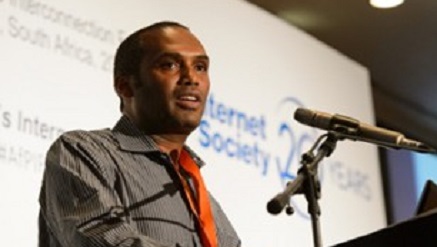E-Business
Internet Society Report Highlights Internet Governance Benefits, Multistakeholder Model

In order to better understand what African nations need to do to reap the full benefits of the Internet, the Internet Society today released the study “Internet Development and Governance in Africa.
The report, issued at the Africa Internet Summit 2015 in Tunis, Tunisia, where Nigeria Internet Registration Association (NiRA) also participated, provides a comprehensive overview of the current state of the Internet in Africa and highlights the importance of the multistakeholder model of Internet governance as an essential part of Africa’s Internet ecosystem.
In light of the rapid growth experienced by the continent in the past ten years, the report finds that the time is right to maximize that potential.
“As Africa’s user base grows, the need to coordinate and manage the growth and development of the Internet becomes increasingly important,” said Dawit Bekele, Internet Society regional bureau director for Africa.
“If Africa has to make the progression towards a digital economy to reap the full benefits of the Internet, it needs to transition from basic connectivity to interconnectivity of networks and to interoperability of systems, and enable the development of applications and services that drive economic and social well-being.”
The report highlights steady adoption of this transformative technology since the introduction of the Internet to Africa in 1991, reaching just over 20% continent-wide, but these aggregate indicators mask glaring disparities in Internet development levels from country to country.
Morocco, for instance, has Internet penetration rates above 50%, while other African countries have penetration rates just under 2%.
The majority of countries have Internet penetration below 10%–well below the 20% threshold found to be critical for countries to reap economic benefits.
IXPs
One of the ways, identified by the report, to improve the interconnectivity of networks is to establish Internet eXchange Points (IXPs) at the local level.
Africa now has more than 30 IXPs and is well on the way to achieving the goal of at least one IXP per country.
The establishment of IXPs can catalyze the build-out of terrestrial infrastructure which in turn would make access to the Internet cheaper and faster.
One example of this effort is the East African Backhaul System (EABS), which will serve Kenya, Tanzania, Uganda, Rwanda, and Burundi.
Through this infrastructure, the landlocked countries of Uganda, Rwanda and Burundi have established backbones that gain access to submarine fiber almost at the same price as that of the coastal countries
Digital Broadcasting
An area that could be transitioned faster is the migration from analogue to digital broadcasting, which offers more opportunities to increase Internet access by freeing up unused spectrum.
By June 2014, only 19 countries had started on the digital transition and by December 2014 only three countries (Tanzania, Rwanda and Mauritius) had completely switched off their analogue signals.
As such, the majority of countries will not meet the ITU’s June 2015 deadline.
IPv6
Another recommendation contained in the report is that the transition to and adoption of IPv6 in Africa should be accelerated.
By ensuring that there are enough IP addresses to cater to current and future expansion of the Internet, IPv6 will enable the Internet-of-Things (IoT) or the Internet of Everything (IoE), which refers to the ability to connect to the Internet anything capable of having an IP address.
Statistics show that South Africa and Egypt account for 97% of the uptake to date, which means all other countries are lagging behind with regards to IPv6 adoption.
Internet Governance
As Africa’s infrastructure and user base grows, the need to coordinate and manage the growth and development of the Internet becomes increasingly important.
Several institutions and processes have emerged over the last 15 years, each playing a role in strengthening Africa’s Internet ecosystem.
Africa has embraced the multistakeholder model of Internet governance, which enables policymakers to draw from the expertise of the relevant stakeholders to develop sustainable Internet public policy approaches that can meet the policy challenges of the digital age.
This year has seen several significant milestones for Internet governance and development.
Among these, the African Union has launched its Agenda 2065, which outlines development objectives for the next 50 years, and the United Nation’s Millennium Development Goals, which end in 2015, will now be replaced by the UN’s Sustainable Development Goals.
Further, the UN General Assembly will make a determination on whether or not to extend the mandate of the Internet Governance Forum, an outgrowth the World Summit on the Information Society, which marks its 10th anniversary this year.
“The growth in Internet access in Africa since 2005 can be attributed in part to the strengthening of existing institutions, the emergence of regional and national IGFs and the increased commitment of African governments to ICT development,” concludes the report.
“As Africa continues to make further strides in building its Internet economy, the multistakeholder model will continue to be an important element of helping Africa reach a critical mass of access and usage that can translate into sustained economic benefit,” according to the report circulated by African Press Organization.
The Internet Society is the trusted independent source for Internet information and thought leadership around the world. It is also the organizational home for the Internet Engineering Task Force (IETF).
With its principled vision, substantial technological foundation and its global presence, the Internet Society promotes open dialogue on Internet policy, technology, and future development among users, companies, governments, and other organizations.
Working with its members and Chapters around the world, the Internet Society enables the continued evolution and growth of the Internet for everyone.
E-Business
AI Slows Down some Experienced Software Developers, Study Finds

Contrary to popular belief, using cutting-edge artificial intelligence tools slowed down experienced software developers when they were working in codebases familiar to them, rather than supercharging their work, a new study found.

AI research nonprofit METR conducted the in-depth study, on a group of seasoned developers earlier this year while they used Cursor, a popular AI coding assistant, to help them complete tasks in open-source projects they were familiar with.
Before the study, the open-source developers believed using AI would speed them up, estimating it would decrease task completion time by 24%. Even after completing the tasks with AI, the developers believed that they had decreased task times by 20%. But the study found that using AI did the opposite: it increased task completion time by 19%.
The study’s lead authors, Joel Becker and Nate Rush, said they were shocked by the results: prior to the study, Rush had written down that he expected “a 2x speed up, somewhat obviously.”
The findings challenge the belief that AI always makes expensive human engineers much more productive, a factor that has attracted substantial investment into companies selling AI products to aid software development.
AI is also expected to replace entry-level coding positions. Dario Amodei, CEO of Anthropic, recently told Axios that AI could wipe out half of all entry-level white collar jobs in the next one to five years.
Prior literature on productivity improvements has found significant gains: one study found using AI sped up coders by 56%, another study found developers were able to complete 26% more tasks in a given time.
But the new METR study shows that those gains don’t apply to all software development scenarios. In particular, this study showed that experienced developers intimately familiar with the quirks and requirements of large, established open source codebases experienced a slowdown.
Other studies often rely on software development benchmarks for AI, which sometimes misrepresent real-world tasks, the study’s authors said.
The slowdown stemmed from developers needing to spend time going over and correcting what the AI models suggested.
“When we watched the videos, we found that the AIs made some suggestions about their work, and the suggestions were often directionally correct, but not exactly what’s needed,” Becker said.
The authors cautioned that they do not expect the slowdown to apply in other scenarios, such as for junior engineers or engineers working in codebases they aren’t familiar with.
Still, the majority of the study’s participants, as well as the study’s authors, continue to use Cursor today.
The authors believe it is because AI makes the development experience easier, and in turn, more pleasant, akin to editing an essay instead of staring at a blank page.
“Developers have goals other than completing the task as soon as possible,” Becker said. “So they’re going with this less effortful route.”
E-Business
Firm Uncovers $500K Crypto Heist Through Malicious Packages

Kaspersky GReAT (Global Research and Analysis Team) experts have discovered open-source packages that download the Quasar backdoor and a stealer designed to exfiltrate cryptocurrency. The malicious packages are intended for the Cursor AI development environment, which is based on Visual Studio Code — a tool used for AI-assisted coding.

The malicious open-source packages are extensions hosted in the Open VSX repository that claim to provide support for the Solidity programming language. However, in practice, they download and execute malicious code on users’ devices.
During an incident response, a blockchain developer from Russia reached out to Kaspersky after installing one of these fake extensions on his computer, which allowed attackers to steal approximately $500,000 worth of crypto assets.
The threat actor behind these packages managed to deceive the developer by making the malicious package rank higher than the legitimate one. The attacker achieved this by artificially inflating the malicious package’s downloads count to 54,000.
After installation, the victim gained no actual functionality from the extension. Instead, malicious ScreenConnect software was installed on the computer, granting threat actors remote access to the infected device.
Using this access, they deployed the open-source Quasar backdoor along with a stealer that collects data from browsers, email clients, and crypto wallets. With these tools, the threat actors were able to obtain the developer’s wallet seed phrases and subsequently steal cryptocurrency from the accounts.
After the malicious extension downloaded by the developer was discovered and removed from the repository, the threat actor republished it and artificially inflated its installation count to a higher number – 2 million, compared to 61,000 for the legitimate package. The extension was removed from the platform following a request from Kaspersky.
“Spotting compromised open-source packages with the naked eye is becoming increasingly difficult. Threat actors are using increasingly creative tactics to deceive potential victims, even developers who have a strong understanding of cybersecurity risks — particularly those working in the blockchain development field.
As we expect adversaries to continue targeting developers, it is recommended that even experienced IT professionals deploy dedicated security solutions to safeguard sensitive data and prevent financial losses,” commented Georgy Kucherin, Security Researcher with Kaspersky’s Global Research and Analysis Team.
The threat actor behind the attack published not only malicious Solidity extensions but also another NPM package, solsafe, which also downloads ScreenConnect. A few months earlier, three additional malicious Visual Studio Code extensions were released — solaibot, among-eth, and blankebesxstnion — all of them have already been removed from the repository.
E-Business
NITDA Reaffirms Commitment to 95% Digital Literacy by 2030, as UBEC Pledges Collaboration

Kashifu Inuwa CCIE, the Director General of the National Information Technology Development Agency (NITDA), has reaffirmed the Federal Government’s unwavering commitment to achieving 95% digital literacy across Nigeria by the year 2030, with an ambitious milestone of 70% by 2027.

This disclosure was made in total alignment with the present administration’s priority areas of reforming the economy for sustained inclusive growth and accelerating diversification through industrialisation, digitisation, creative arts, manufacturing, and innovation.
Making this known during a collaborative meeting hosted by the Universal Basic Education Commission (UBEC), Inuwa highlighted the government’s strategic prioritisation of human capital development as central to its national transformation agenda.
“We started this journey in 2023 when President Bola Ahmed Tinubu came on board and he made it clear that economic diversification and inclusivity are part of the administration’s agenda,” he noted.
“And the president outlined this in 8 priority areas to achieve the vision, with priority number 7 specifically focused on accelerating industrialisation, digitisation, creative arts, manufacturing, and innovation,” he added.
Recognising the importance of digital fluency in achieving this agenda, he stated that NITDA is committed to investing in the digital empowerment of citizens through the development of the National Digital Literacy Framework (NDLF), a strategic blueprint aligned with international best practices.
He added that to tailor the framework to Nigeria’s specific needs, 6 core competency areas were incorporated to include device and software operations, information and data literacy, communication and collaboration, content creation, safety, and problem solving.
He explained that the framework would address all levels of digital fluency, from basic, intermediate to advanced levels, to make digital skills accessible to every Nigerian, from primary school pupils to working professionals.
According to Inuwa, despite data limitations, NITDA estimates that Nigeria’s digital literacy rate currently stands at 50%, up from 44% in 2021, based on extrapolations from the World Bank’s Better Life Report.
The NITDA DG disclosed that the agency has been working closely with the Nigerian Educational Research and Development Council (NERDC) in developing a curriculum for digital literacy, which can be infused into formal education. Stating that the visit is a continuation of NITDA’s ongoing engagements with key education stakeholders, including the Federal Ministry of Education, the National Universities Commission (NUC), and the Nigerian Educational Research and Development Council (NERDC), all aimed at advancing digital literacy across all levels of learning.
Inuwa also revealed ongoing collaborations with global platforms such as Coursera to train teachers using AI-powered lesson generation tools and provide scalable online training.
It is worth recalling that late last year, NITDA partnered with the Nasarawa State University in collaboration with CISCO in launching the Digital Learning for NSUK (DL4NSUK) initiative to enhance digital literacy in tertiary institutions, and equipping graduates with the skills needed to be digitally proficient and globally competitive.
While stressing that the entire process, from curriculum development to classroom delivery, would require a whole-of-government and whole-of-society approach, Inuwa said, “This is not a journey we can walk alone; we must bring everyone on board, education stakeholders, technology providers, state governments, and international partners.”
In response to the DG’s remarks, UBEC Executive Secretary, Hajiya Aisha Garba, confirmed that the Commission has officially received the digital literacy curriculum developed by NITDA and NERDC and has commenced internal review processes.
She acknowledged the curriculum as robust and forward-looking but stressed the need for simplification to suit early learners and teachers, citing challenges such as curriculum overload, limited teacher capacity, and inadequate infrastructure as key barriers to effective implementation.
She pledged that UBEC, in partnership with the State Universal Basic Education Board (SUBEB), will lead efforts to equip schools with computers and solar-powered infrastructure to support real learning.
“We’re committed to working with NITDA and NERDC to refine the curriculum, train teachers, and ensure effective delivery. Let us align the technical vision with grassroots realities to make a lasting impact,” she concluded.
To formalise the implementation of the meeting’s resolutions, a joint inter-agency committee was established to develop strategic plans that will ensure the effective rollout of the digital literacy initiative, to equip young Nigerians with the essential digital skills required to thrive in an increasingly dynamic and technology-driven global landscape.

 E-Financial3 days ago
E-Financial3 days agoGOEs’ Remit Over ₦2tn to FG in 2024

 News2 days ago
News2 days agoCheck Point Report Finds Africa as Top Target for Cyber-attacks

 Telecom3 days ago
Telecom3 days agoSave & Win: FCMB Promo Makes 12 Millionaires, Over 3,000 Winners

 News2 days ago
News2 days agoJAMB Accuses Student of Securing Admission through Identity Fraud

 Telecom3 days ago
Telecom3 days agoMTN’s Karl Toriola and Business Leaders Champion Corporate Climate Reform

 General News3 days ago
General News3 days agoSenate Orders Full Probe into N1.3 Trillion CBEX Ponzi Scandal

 E-Business3 days ago
E-Business3 days agoNITDA Reaffirms Commitment to 95% Digital Literacy by 2030, as UBEC Pledges Collaboration

 E-Financial2 days ago
E-Financial2 days agoEFCC Recovers Funds Lost to CBEX Fraud



























